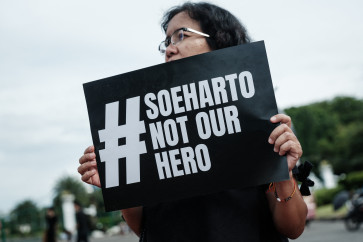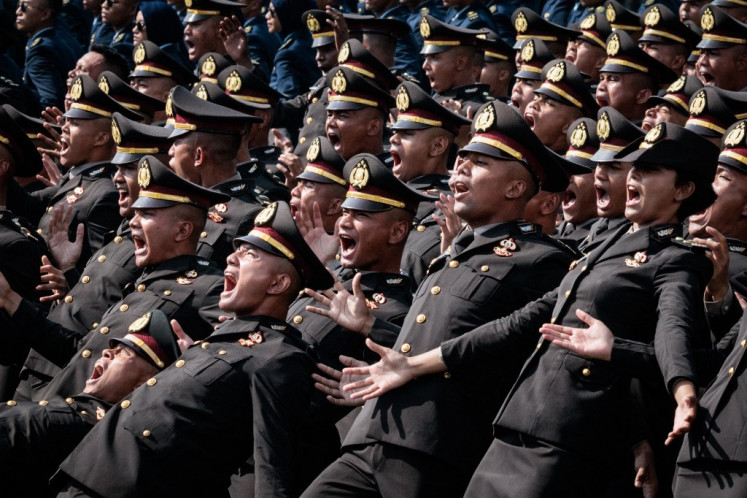Popular Reads
Top Results
Can't find what you're looking for?
View all search resultsPopular Reads
Top Results
Can't find what you're looking for?
View all search resultsA state embarrassed
Seven years after Munir Said Thalib was found dead on a Garuda flight on Sept
Change text size
Gift Premium Articles
to Anyone
S
even years after Munir Said Thalib was found dead on a Garuda flight on Sept. 7, 2004, the state has ridiculed and embarrassed itself by treating his case as mystery — his death, the motives, the conspiracy and other aspects of the tragedy.
A leading figure at the State Intelligence Agency (BIN), former elite Army Kopassus unit commander Maj. Gen. (ret.) Muchdi Purwoprandjono, was among the key suspects in Munir’s poisoning, but two years ago he was acquitted by a Jakarta court.
Fundamentally, formal justice is one thing, but in the public sense it is another. Seven years on, the gap between the legal process and public anger about what is perceived as justice in Munir’s case has only grown bigger.
Even the President, who declared the investigation into Munir death “a test case of history”, seems to have lost the spirit to revive his promise. Years have passed, but he has yet to officially publish the investigation report he commissioned.
At this stage, a few key aspects need to be considered.
On Sept. 7, 2004, just hours after Munir left Singapore’s Changi airport for Amsterdam the night of Sept. 6, convicted off-duty Garuda pilot Pollycarpus Budihari Priyanto, upon returning from Singapore, called Muchdi’s assistant, Budi Santoso, and told him, “Pak, I have got the big fish!” When asked if he had reported it to Muchdi, Pollycarpus replied positively, as quoted by prosecutor Cyrus Sinaga at Muchdi’s trial Aug. 20, 2008.
Earlier at the airport, an eyewitness later testified that Pollycarpus brought a drink to Munir — his “Big Fish”. The court assumed that that was the locus delicti where the poisoning took place. Strangely though, Budi Santoso was not present to testify in the Muchdi trial, and a second possible eyewitness from Changi who might have been questioned was not even mentioned.
Next, no less than 41 phone calls have been detected between Pollycarpus and a mobile phone owned by Muchdi.
However, neither Pollycarpus’ call to Budi Santoso nor those to Muchdi were brought as evidence at the Muchdi trial. Muchdi’s argument (“My mobile could be used by anyone.”) was accepted without further questioning.
Even more strangely, the recordings of the 41 calls that were deciphered by a Seattle lab (the existence of which had earlier been confirmed by both the Attorney General’s Office and the then National Police detective chief Comr. Gen. Bambang Hendarso Danuri) have reportedly vanished.
The police investigation also seems insufficient regarding what might have occurred during Garuda’s last leg from Singapore to Amsterdam.
Medical experts were astonished by the amount of arsenic found — not only in Munir’s body, but on his clothing, seat, the carpet and toilet. So much, that is, that another attempt — in addition to the one at Changi — to poison Munir seemed likely. Indeed, it’s the standard practice of any state intelligence agency to have a “Plan B” to ascertain the result of “Plan A”, or to escape if it fails.
These are a few hard facts among many. Moreover, there are questions concerning the death, if it is a mystery, of a number of people who ought to know more about Munir’s demise.
Some justice officials involved in trials related to Munir’s case have been implicated in mafia-like practices. If the legal, judicial processes and police investigations are unsatisfactory, the executive and legislative institutions, too, seem to have done little.
For example, has the President, being the so-called “single user” of the BIN, seriously called for the BIN’s responsibility and probed its then chief Gen. (ret.) A.M. Hendropriyono? Did he ask then National Police chief Gen. Sutanto to explain the latter’s statement that the BIN was not involved in Munir’s death?
Likewise, what has the President’s Foreign Ministry done to get Budi Santoso — posted at an RI embassy in Islamabad and later in Kabul — to testify at Muchdi’s trial? Has Kopassus probed one of its members who apparently had knowledge of instructions to kill Munir?
Finally, has any legislator or political party ever seriously called BIN staffers and pushed the government to review and help solve the Munir case?
Former legislator Suripto, himself a former intelligence officer, has, on the basis of “a professional intelligence source” claimed that “action” against Munir was discussed at a BIN meeting, “possibly in August of 2004”, which was led by Hendropriyono and attended by five staff members. (Radio Netherlands, June 24, 2008)
The plan, Suripto said, was assigned to BIN Deputy 2 (Manunggal Maladi, now deceased) and the implementation was Deputy 5’s (Muchdi) responsibility. No BIN staffer was ready to respond.
Munir, the human rights defender, was but one individual. But his death and the mystery surrounding his assassination may have a symbolic implication for the nation.
Unlike the Great Tragedy of 1965-1966, Munir’s case was a single instance of state violence against a rights activist. But like the mass killings of civilians in the 1960s, which have become a national trauma, it will be remembered plain and simple as state terrorism.
State killing like this — ironically Munir was born in that fatal year of 1965 — would have been inconceivable without the rise and legacy of Soeharto’s militarized New Order.
Given the contradiction between the state’s judicial regime and the public perception of justice in the Munir case, Munir’s symbolizes state embarrassment. For what else can be said of a seemingly simple but unresolved case of a criminal act that reveals so much incredible carelessness and powerlessness, if not incompetence, of the state
apparatuses, in addition to political secrecy?
The writer is a journalist, formerly with Radio Netherlands.










